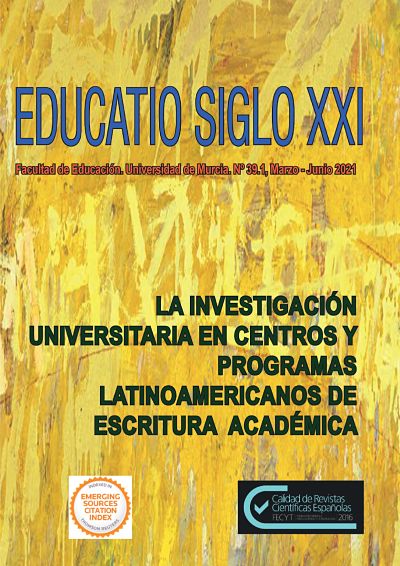"Let's start with the title": The comprehensive representation of doctoral research in only a few words
Abstract
This article is part of the research of the Corpus EspaDA-UNCuyo team. Starting from the potential of writing to transform knowledge, we aim to (re)write the thematic title of the academic genre "thesis project" as an instance of reflection on and consolidation of the processes involved in doctoral research. The formal delimitation of the thesis topic is one of the biggest problems for doctoral students and one of the recurring reasons for non-compliance with the institutionally established deadlines for project presentation. Contextualized within an agronomy Ph.D. program, our research adopts a qualitative, descriptive, longitudinal and applied design. The documentary data come from (a) admission projects to a Ph.D. program; (b) thesis projects; (c) transcripts of oral vivas of thesis projects. The findings suggest that the modeling and clarification of the academic-scientific writing process, as well as the collaborative tasks of (re) writing thematic titles between expert professional peers, favour the consolidation of, and reflection on research understood as an integral process. The modeling and clarification of the academic-scientific writing process also elicits reflection on the contribution to the disciplinary field, the first requirement of a doctoral thesis.
Downloads
-
Abstract829
-
PDF (Español (España))644
References
Álvarez, G. y Difabio, H. (2017). La actividad metalingüística en espacios de interacción entre pares: reflexiones en torno a un taller virtual orientado a la escritura de la tesis de posgrado. Perfiles Educativos, XXXIX (155), 51-67. Recuperado de http://www.scielo.org.mx/scielo.php?script=sci_abstract&pid=S0185-26982017000100051&lng=es&nrm=iso
Álvarez, G. y Difabio, H. (2019). Retroalimentación entre pares en un taller virtual de escritura de tesis de posgrado. Apertura, 11(2), 40-53. doi.org/10.32870/Ap.v11n2.1540
Arnoux, E. (2006) Incidencia de la lectura de pares y expertos en la reescritura del trabajo de tesis. RLA. Revista de Lingüística teórica y aplicada, 44(1), 95-118.
Arnoux, E.; Borsinger, A.; Carlino, P.; di Stefano, M.; Pereira, C. y Silvestri, A. (2004). La intervención pedagógica en el proceso de escritura de tesis de posgrado. Revista de la Maestría en Salud Pública, 2(3), 1-16.
Bosio, I. (2018). ¿Podemos mejorar la calidad de la escritura en el posgrado? Algunas respuestas a partir de un proceso de investigación-acción. RBLA, Revista Brasileira de Linguística Aplicada, 18(3), 737-769. doi.org/10.1590/1984-6398201812959
Carlino, P. (2009). Exploración de géneros, diario de tesis y revisión entre pares: Análisis de un ciclo de investigación-acción en talleres de tesis de posgrado. En E. Narvaja, Escritura y producción de conocimiento en carreras de posgrado. Buenos Aires: Santiago Arcos, pp. 227-246.
Chois, P. y Jaramillo, L. (2016). La investigación sobre la escritura en posgrado: estado del arte. Lenguaje, 44(2), 227-259. Recuperado de http://www.scielo.org.co/scielo.php?pid=S0120-34792016000200005&script=sci_abstract&tlng=es
Colombo, L. y Cartolari, M. (2013). La escritura de las tesis: el rol de las relaciones entre pares. V Congreso Internacional de Investigación y Práctica Profesional en Psicología, XX Jornadas de Investigación, Noveno Encuentro de Investigadores en Psicología del MERCOSUR. Buenos Aires: Facultad de Psicología, Universidad de Buenos Aires, 91-96.
Cubo de Severino, L. y Bosio, I. (2012). La tesis como clase textual y su proceso de escritura. En L. Cubo de Severino, H. Puiatti y N. Lacon (Comp.), Escribir una tesis. Manual de estrategias de producción (pp. 11-34). Córdoba: Comunicarte.
Padilla, C. (2016). Desafíos epistémicos y argumentativos en la escritura de postgrado: géneros científico-académicos y trayectorias de maestrandos y doctorandos. Traslaciones. Revista Latinoamericana de Lectura y Escritura, 3(6), 165-196. Recuperado de http://revistas.uncu.edu.ar/ojs/index.php/traslaciones/article/view/813
Pereira, C. y di Stefano, M. (2007). El taller de escritura en posgrado: Representaciones sociales e interacción entre pares. Revista Signos. Estudios de Lingüística, 40(64), 405-430. doi.org/10.4067/S0718-09342007000200007
Scardamalia, M. y Bereiter, C. (1992). Dos modelos explicativos de los procesos de composición escrita. Infancia y Aprendizaje, 58, 44-63. Recuperado de https://dialnet.unirioja.es/servlet/articulo?codigo=48395
Taborga, H. (1982). Cómo hacer una tesis. México: Grijalbo.
Nothstein, S. y Valente, E. (2016). La producción de escritos en postgrados internacionales. La incidencia de las tradiciones académicas en la apropiación y producción de saberes. Revista Signos. Estudios de Lingüística, 49 (Supl.1), 127-148. doi.org/10.4067/S0718-09342016000400007
Valente, E. (2016). Reescritura, reflexión teórica y argumentación en el nivel de posgrado. Traslaciones. Revista Latinoamericana de Lectura y Escritura, 3(6), 135-164. Recuperado de http://revistas.uncu.edu.ar/ojs/index.php/traslaciones/article/view/812
Copyright (c) 2021 Servicio de Publicaciones de la Universidad de Murcia

This work is licensed under a Creative Commons Attribution-NonCommercial-NoDerivatives 4.0 International License.
Original work publishes in this journal is subject to the following terms:
1. Murcia University Press (the publishing house) holds the copyright of the publishes work, and favours and allows their reutilization under the use license stated in point 2.
© Servicio de Publicaciones, Universidad de Murcia, 2015
2. Work is published in the electronic edition under a license (Creative Commons Reconocimiento-NoComercial-SinObraDerivada 4.0 España (legal text). They can be copied, used, disseminated, transmitted and publicly presented, as long as: i) authorship and original publication source is acknowledged (journal, publishing house and URL of the work); ii) are not used for commercial purposes; iii) the existence and specifications of this use license is stated.
3. Conditions for self-archive. Authors are allowed and encouraged to disseminate electronically the pre-pint (before review) and/or post-print (accepted for publication) versions of their work before their publication since that favours earlier circulation and dissemination resulting in an increased chance for the authors to be cited and for the work to reach a bigger share of the academic community. Colour: RoMEO: green.








